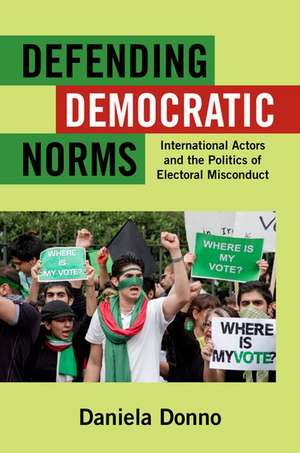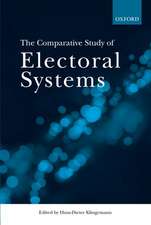Defending Democratic Norms: International Actors and the Politics of Electoral Misconduct
Autor Daniela Donnoen Limba Engleză Paperback – 19 sep 2013
| Toate formatele și edițiile | Preț | Express |
|---|---|---|
| Paperback (1) | 192.30 lei 32-37 zile | |
| Oxford University Press – 19 sep 2013 | 192.30 lei 32-37 zile | |
| Hardback (1) | 775.28 lei 32-37 zile | |
| Oxford University Press – 19 sep 2013 | 775.28 lei 32-37 zile |
Preț: 192.30 lei
Preț vechi: 222.56 lei
-14% Nou
Puncte Express: 288
Preț estimativ în valută:
36.80€ • 38.02$ • 30.61£
36.80€ • 38.02$ • 30.61£
Carte tipărită la comandă
Livrare economică 10-15 martie
Preluare comenzi: 021 569.72.76
Specificații
ISBN-13: 9780199991297
ISBN-10: 0199991294
Pagini: 290
Ilustrații: 18 illustrations
Dimensiuni: 231 x 155 x 20 mm
Greutate: 0.39 kg
Editura: Oxford University Press
Colecția OUP USA
Locul publicării:New York, United States
ISBN-10: 0199991294
Pagini: 290
Ilustrații: 18 illustrations
Dimensiuni: 231 x 155 x 20 mm
Greutate: 0.39 kg
Editura: Oxford University Press
Colecția OUP USA
Locul publicării:New York, United States
Recenzii
This book can be relevant not only to academics and researchers of IR or political science but also to practitioners of democracy promotion such as aid-agency staff through providing insightful food for thought about international norm enforcement and democratic change. In sum, I can say that this well-written book is significantly useful and highly recommendable, particularly to relevant students like me.
Defending Democratic Norms is an important contribution examining how international norms of democratic governance shape national elections. The work is optimistic about these norms, yet in this original, exhaustively researched, and well-written book Donno reminds us that the path to free and fair elections can be rocky. Donno carefully outlines the conditions under which international actors monitor elections, punish misbehavior, and, in the process, help preserve democracy. This book adds important knowledge to the fields of international relations and comparative politics.
Donno offers an ambitious and compelling analysis of a crucial question in democracy promotion: whether international commitments to democracy are actually enforced. Rather than assuming all democracy promotion is weak or inconsistent, this book offers a more nuanced and global picture, demonstrating when enforcement of international democratic norms is most likely to work, and addressing the important question of when and how enforcement can further democratization.
Daniela Donno's groundbreaking and carefully researched new book provides evidence that the international community sometimes does take steps to enforce democratic norms and that these steps can be effective in making elections more free and fair. Donno operates at the cutting edge between comparative politics and international relations, showing how we need to take both external and internal factors into account if we are to understand why some democratization projects fail or succeed. The book should be required reading for anyone interested in evidence-based democratization efforts.
Defending Democratic Norms is an important contribution examining how international norms of democratic governance shape national elections. The work is optimistic about these norms, yet in this original, exhaustively researched, and well-written book Donno reminds us that the path to free and fair elections can be rocky. Donno carefully outlines the conditions under which international actors monitor elections, punish misbehavior, and, in the process, help preserve democracy. This book adds important knowledge to the fields of international relations and comparative politics.
Donno offers an ambitious and compelling analysis of a crucial question in democracy promotion: whether international commitments to democracy are actually enforced. Rather than assuming all democracy promotion is weak or inconsistent, this book offers a more nuanced and global picture, demonstrating when enforcement of international democratic norms is most likely to work, and addressing the important question of when and how enforcement can further democratization.
Daniela Donno's groundbreaking and carefully researched new book provides evidence that the international community sometimes does take steps to enforce democratic norms and that these steps can be effective in making elections more free and fair. Donno operates at the cutting edge between comparative politics and international relations, showing how we need to take both external and internal factors into account if we are to understand why some democratization projects fail or succeed. The book should be required reading for anyone interested in evidence-based democratization efforts.
Notă biografică
Daniela Donno is Assistant Professor of Political Science at the University of Pittsburgh.












